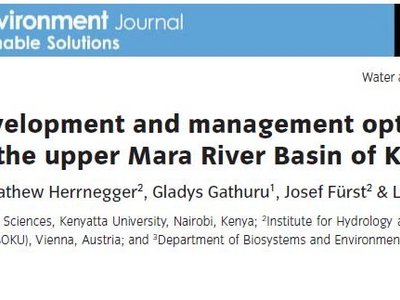

The study investigates the water supply and demand in the Nyangores catchment of the upper Mara River Basin, a basin that is roughly located between Nairobi and Lake Victoria, and stretches southwards across the border to Tanzania. Combining socioeconomic information with hydrometerological evidence and spatial data sets, the authors draw a picture of the status quo concerning water resources and water use in that area. They continue by simulating future scenarios until 2030, using the Water Evaluation and Planning System Version 21 (WEAP21). The scenarios included higher population growth, increased irrigation and improved water efficiency. The simulations indicate that in all of the scenarios water demand will increase. Water conservation measures would have the potential to mitigate this increased demand.
Article details: Omonge, Paul; Herrnegger, Mathew; Gathuru, Gladys; Fürst, Josef; Olang, Luke. 2020. "Impact of development and management options on water resources of the upper Mara River Basin of Kenya" In Water and Environment Journal published by John Wiley & Sons Ltd on behalf of Chartered Institution of Water and Environmental Management. First published: 02 March 2020. The article was published under the terms of the Creative Commons Attribution License.
The study was funded in the framework of the project MaMa-Hydro: Exploring water resources planning and management options. A baseline study to assess the hydrological situation of the vulnerable Maasai Mara River Basin in Kenya, financed by the Commission for Development Research (KEF) at the OeAD-GmbH.
Paul Omonge is a PhD candidate at the Institute for Hydrology and Water Management (HyWa), University of Natural Resources and Life Sciences, Vienna (BOKU). He was nominated for his PhD within the APPEAR project CapNex that aims at capacity building on the water-energy-food security Nexus through research and training in Kenya and Uganda. His research focuses on forecasting water availability and use amid competing socioeconomic and climatic stress. He previously lectured at the Department of Biosystems and Environmental Engineering, Technical University of Kenya. He holds a Master’s degree in Environmental Sciences from Kenyatta University. He worked as a conservation officer for Nature Kenya as well as an assistant researcher in the Maasai-Mara basin hydrological project (MaMa-Hydro) at Kenyatta University, financed by KEF. Paul won several awards; the Joke-Waller Hunter Young Environmental leader award and the Rufford Small Grants (RSG) for Nature. The RSG enabled him to implement an indigenous knowledge-based approach to the conservation of the Nyangores catchment of the upper Mara River basin where he did his MSc Studies.
